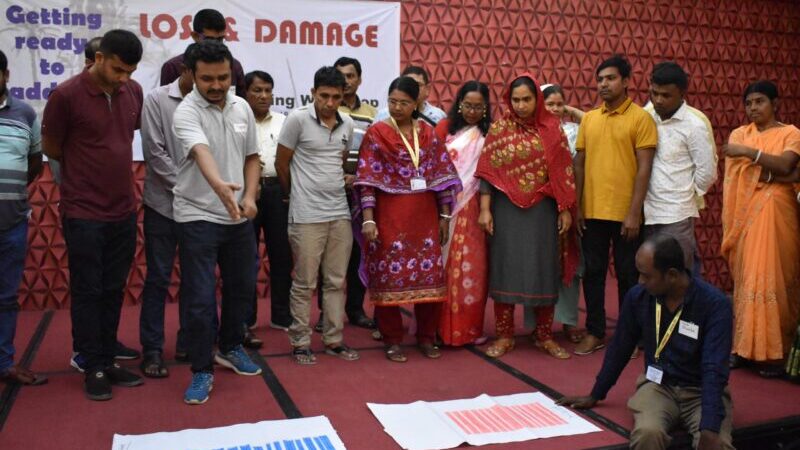Sea level rise, powerful cyclones and devastating floods are some of the few climate-related events that are destroying the lives and livelihoods of the poorest people in Bangladesh.
The severity of the climate-related impacts often requires families to move away from their homes. This form of migration has economic and emotional implications. It forces primary caretakers to learn new skills so that they can provide for their families. It also results in the loss of traditional knowledge as they distance themselves from their homelands to make a living. This is the hard reality of loss and damage.
Through its Panii Jibon project, Helvetas Bangladesh works alongside these families to support them as they examine their migration options. This support involves skill development and training so families can earn a living without migrating.
For households who choose to relocate, Helvetas Bangladesh offers these same services so that they can find employment once they arrive in a new place. Helvetas Bangladesh’s loss and damage approach also includes helping households make more informed and economically successful decisions about migration through the smart use of remittances.
Supporting migrants to be more strategic about these payments ensures that those left behind – often women and children – can address the loss and damage they have already experienced and the future loss and damage they will encounter.
This summer, the Climate Justice Resilience Fund – thanks to funding from the Scottish Government – granted US$250,000 to support Helvetas Bangladesh’s loss and damage work.
In addition to the economic support that the organisation will provide, Helvetas Bangladesh will use the funding to collect data on the social and economic well-being of the families supported by the Panii Jibon project. This study will examine factors that lead to loss of well-being including property sales, increased debt, and child labor.
This data collection effort will also lead to a gender-segregated database of seasonal or temporary migrant workers. Collecting this type of data will allow other organisations to use the information as a starting point for advocacy around migration at the regional and global levels. Ashish Barua, program manager at Helvetas Bangladesh, says this data collection is critical as the program focuses on supporting those who understand the reality of loss and damage.
“We are advocating for people who are suffering. Having this baseline data will tell us what’s happening,” Barua said. “Strong evidence from the ground will help us influence the government and other relevant stakeholders to take action. We hope the data will also support global negotiations on loss and damage both inside and outside the United Nations Framework Convention on Climate Change processes.”
Connecting with those most harmed by loss and damage is an important component of how Panii Jibon operates. For example, this past July, the organisation held a planning workshop to better understand the impact of loss and damage, bringing in community members to explain what they have lost as the climate changes.
“One of the principles of our project is ‘most affected, most participated,’” Barua said. “Our planning workshops start with a design that will engage the community. This way, whatever we do in our design, implementation, monitoring, or evaluation, we can do our best to provide the space for project participants to make decisions.”
Community participation allows organisations like Helvetas Bangladesh to recognise their limitations when trying to address loss and damage.
“In most cases, organisations cannot understand the full reality of the most climate-vulnerable people,” Barua said. “A climate justice approach to loss and damage requires opening space for the most affected people to make meaningful decisions.”
Barua says this bottom-up approach allows for true solutions to emerge.
“When the community contributes, they bring their experiences and can create solutions that work for them.”
“Loss and damage” is a term used in United Nations climate negotiations to refer to the consequences of climate change that go beyond what people can adapt to. The term also refers to situations when options for adaptation exist, but communities do not have the resources to use them. Loss and damage often results in a loss of traditional knowledge, livelihoods, or culture—priceless aspects of identity.
This article is part of a three-part series that highlights elements of how organisations are addressing loss and damage across the globe. First, we examine the loss and damage efforts of Helvetas Bangladesh, which is part of a network of independent development organisations working to implement humanitarian projects, including those related to climate change.
This post was sponsored by the Climate Justice Resilience Fund. See our editorial guidelines for what this means.
